The present perfect is used to talk about the past, but there’s often a connection to the present.
USES OF PRESENT PERFECT
Actions that started in the past and continue to the present.
- They have lived in that house for years.
- I have been a teacher since 2019.
- She’s worked here for a while now.
- Daniel has played the guitar since he was young.
Useful vocabulary for actions that started in the past and continue to the present: for (durations) and since (from a point in time)
When the time period has not yet finished.
- It has rained a lot this year.
- I’ve travelled so much already this month.
- They haven’t eaten much yet.
- The team still hasn’t won a game this season.
Useful vocabulary for unfinished time periods: already (expresses that something happened sooner than expected), yet (up until now), still (up until now)
Something that happened in the past but is relevant in the present.
- I’m not hungry because I’ve already eaten.
- He can speak fluent Spanish because he’s lived in Spain before.
- She hasn’t studied much for the exam yet so she’s a bit worried.
- The garden looks ugly because the roses haven’t grown yet.
Useful vocabulary for past actions that are relevant in the present: already (expresses that something happened sooner than expected), yet (up until now), still (up until now)
Life experiences without specifying when they happened. The time is not important or not known.
- She has never been to Delhi.
- They have climbed several mountains.
- We have seen incredible wildlife.
- You’ve never met my sister.
Useful vocabulary for life experiences: never (to say that you have not experienced something)
Actions that happened in the very recent past.
- We have just arrived at the party.
- Margaret has just announced that she’s pregnant.
- The kettle has just boiled. Would you like a cup of tea?
- Come and watch the movie! It’s just started.
Useful vocabulary for the recent past: ‘just’ to emphasise how recent
STRUCTURE
For positive sentences, use ‘have’ or ‘has’ after the pronoun, plus the verb in the past participle. We usually contract the form with an apostrophe.
- I have walked > I‘ve walked
- You have walked > You‘ve walked
- He has walked > He‘s walked
- It has walked > It‘s walked
- We have walked > We‘ve walked
- They have walked > They‘ve walked
For negative sentences, add ‘not’ after ‘have’ or ‘has’. We usually contract the form with an apostrophe.
- I have not walked > I haven’t walked
- You have not walked > You haven’t walked
- He has not walked > He hasn’t walked
- She has not walked > She hasn’t walked
- It has not walked > It hasn’t walked
- We have not walked > We haven’t walked
- They have not walked > They haven’t walked
To ask yes/no questions, change the order of the sentence so that ‘have’ or ‘has’ is at the beginning.
- Have I walked?
- Yes, you have
- No, you haven’t
- Have you walked?
- Yes, I have
- No, I haven’t
- Has he walked?
- Yes, he has
- No, he hasn’t
- Has she walked?
- Yes, she has
- No, she hasn’t
- Has it walked?
- Yes, it has
- No, it hasn’t
- Have we walked?
- Yes, we have
- No, we haven’t
- Have they walked?
- Yes, they have
- No, they haven’t
To ask for more information, add the ‘who, what, where, why, how, when’ question words at the beginning.
- Why have I walked?
- Who have you walked with?
- Where has he walked?
- When has she walked?
- How have they walked?
- When have they walked?
It’s also very common use the word ‘ever’ when asking if someone has done something before.
- Have you ever been to New Zealand?
- No, I haven’t.
- Has she ever driven a car?
- Yes, she has.
